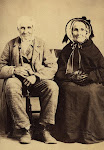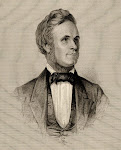Company Number Five was made up of people from Woodruff and vicinity near Evanston, Wyoming, and consisted of twenty-three teams, twenty-seven men, nine women, twenty children and from seventy-five to one hundred head of horses. The officers were James Session, captain: David Lewis, first assistant; Walter Graham, second assistant; and Joseph H. NeVille, chaplain.
As many teams were on the road without any organization, it became necessary at the crossing of the Green River to create a new company composed of part of Company Number Five and the teams that were traveling without officers. This new company was Number Six, and consisted of twenty teams. about twenty-six men, nine women, nineteen children, and forty-eight head of horses. The officers were Israel Stoddard, captain: and Thomas Heaps, chaplain. These companies were at Hams Fork May 3rd, and arrived at the camp ground in the Big Horn Basin on the 24th.
Company Number Seven was also organized, with James A. Lee, captain, and was in close proximity to Companies Five and Six. These all traveled on the route given above, and came to camp May 24th, by way of Meeteetse and Cody.
While all these teams and people were on the road to the Big Horn, Elders Woodruff and Crosby had been at work making a survey of the canal. They had hired a Mr. J. J. Marshall to do the engineering work. He was a very fine engineer as well as a real gentleman.
Abraham O. Woodruff outlined the great task that was before them. "The canal will be thirty-seven miles long and must be large enough to carry the water to irrigate from twelve to fifteen thousand acres of land. The work has not begun, but it will start tomorrow at the head, some distance from where we are now holding this meeting. It will take a united effort to perform this gigantic task, for we are few in number. I urge you to keep the Word of Wisdom, pay your tithes and offerings. Do not profane the name of the Diety. Be honest with all men. Honor the Sabbath Day, and if you do these things, this will be a land of Zion unto you and your children and children's children throughout the generations that are to come. And that you may be united, I now, as an apostle of the Lord Jesus Christ, call each and all of you upon a mission to help build up this country and if you will do this, the Lord will bless you forever." Numbers of men who had come out only to see the country decided to remain.
The Building of the Sidon Canal. The people moved their wagons and pitched their tents near the head of the proposed canal and on the 28th day of May, about 11:00 a.m., they, under the direction of Mr. Woodruff. kneeled at the head of the canal, and he dedicated the canal and lands to the Lord for the home of the people and after doing so he held the plow and Byron Sessions, who had been called to take charge of the construction of the ditch, drove the team and the ground was broken, which began the work to carry water to this barren waste of land.
As September arrived it was found that it was getting time for the people to prepare for cold weather. It was decided by the directors that the ditch would have to be discontinued, that shelter might be provided for the people. Mr. Woodruff came out to see what had been accomplished and to confer with the directors as to what course should be pursued. People could not build homes, for no one had land upon which to build. It was decided that the lands should be divided by lot, and Charles A. Welch was instructed to make out a description of each tract of land, the amount of water for each tract, and the class to which it belonged, and then make a list of the amount of land wanted by each person, whether 40, 80, 120, or 160 acres. The land for townsites on the two benches where the towns of Byron and Cowley are located was held out of the lists that were prepared for the drawing. When the lists of the lands had been prepared and everything was ready, the day was set for the drawing of the land. All the men who wanted to settle on the upper or Byron bench had the privilege of doing so, and there were enough people to take all the lands on the flat. The 40-acre men were the first to draw, then the 80, then the 120, and last of all the 160-acre tracts were drawn. Then the lands on the Cowley fiat were disposed of in the same manner.
After the drawing men could be seen going in all directions to find out where their homes were to be found, some were on horseback, some in buggies and wagons, and others were walking. Many of them got a glimpse of the Cowley flat for the first time when they drove over the sand hill between the two flats. There was a cessation of work on the ditch, for the men were anxious to get out logs with which to build cabins. Others were making preparations to go work on the railroad for the winter.
New Recruits. The place was a town of tents and covered wagons. It was a serious situation, and the people realized that if the Lord did not come to the rescue, no one knew what would become of all the work they had done. In the humility of their souls they sought the Lord for assistance in that sad hour. A. O. Woodruff urged all to join in the fast and prayer for they were to ask for a very much needed blessing. Not many days passed before assistance came in the following manner:
As the officers of the company were looking over the lands that had been reserved for the townsite on the upper bench, a team and buggy were seen coming over the sand hills, and as they came to the place where the canal officers were making their inspection of these lands, the gentleman stopped the horses and said, "I am looking for the leader of the Mormon colony. I want the gentleman who is in charge of that people." Some of the men in the group, pointing to Elder Woodruff, said, "There he is." The stranger then said, "My name is I. S. P. Weeks. I am the chief engineer of the Burlington Railroad, and I want to let this people have twenty miles of railroad to build." When the Burlington Railroad officials learned that the Mormons were going to plant a colony in the Big Horn Basin, they decided to build a line into the country. Woodruff replied, "I am the man who is directing the movement of the Mormons into this part of the country, and I am glad to meet you, Mr. Weeks. We shall be very glad to do this work for you. The people have been at work on a canal, and it will soon be time to do other things as winter approaches."
Subscribe to:
Post Comments (Atom)









No comments:
Post a Comment